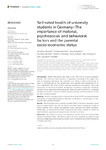2023-02-10Zeitschriftenartikel
Self-rated health of university students in Germany–The importance of material, psychosocial, and behavioral factors and the parental socio-economic status
Deindl, Christian
Diehl, Katharina
Spalleck, Jacob
Richter, Matthias
Schüttig, Wiebke
Rattay, Petra
Dragano, Nico
Pischke, Claudia R.
Introduction: Health inequalities start early in life. The time of young adulthood, between late teens and early twenties, is especially interesting in this regard. This time of emerging adulthood, the transition from being a child to becoming an adult, is characterized by the detachment from parents and establishing of an own independent life. From a health inequality perspective, the question about the importance of the socio-economic background of parents is important. University students are an especially interesting group. Many students come from a privileged background and the question of health inequality among university students has not yet been properly studied.
Methods: Based on the National Educational Panel Study (NEPS), we analyzed health inequalities among 9,000 students in Germany (∅ 20 years in the first year of their studies) over a period of 8 years.
Results: We found that most university students (92%) in Germany reported a good and very good health. Yet, we still found substantial health inequalities. Students whose parents had a higher occupational status reported less health problems. Additionally, we observed that health inequalities had indirect impact on health via health behavior, psychosocial resources, and material conditions.
Discussion: We believe our study is an important contribution to the understudied subject of students' health. We see the impact of social inequality on health among such a privileged group like university students as an important sign of the importance of health inequality.

